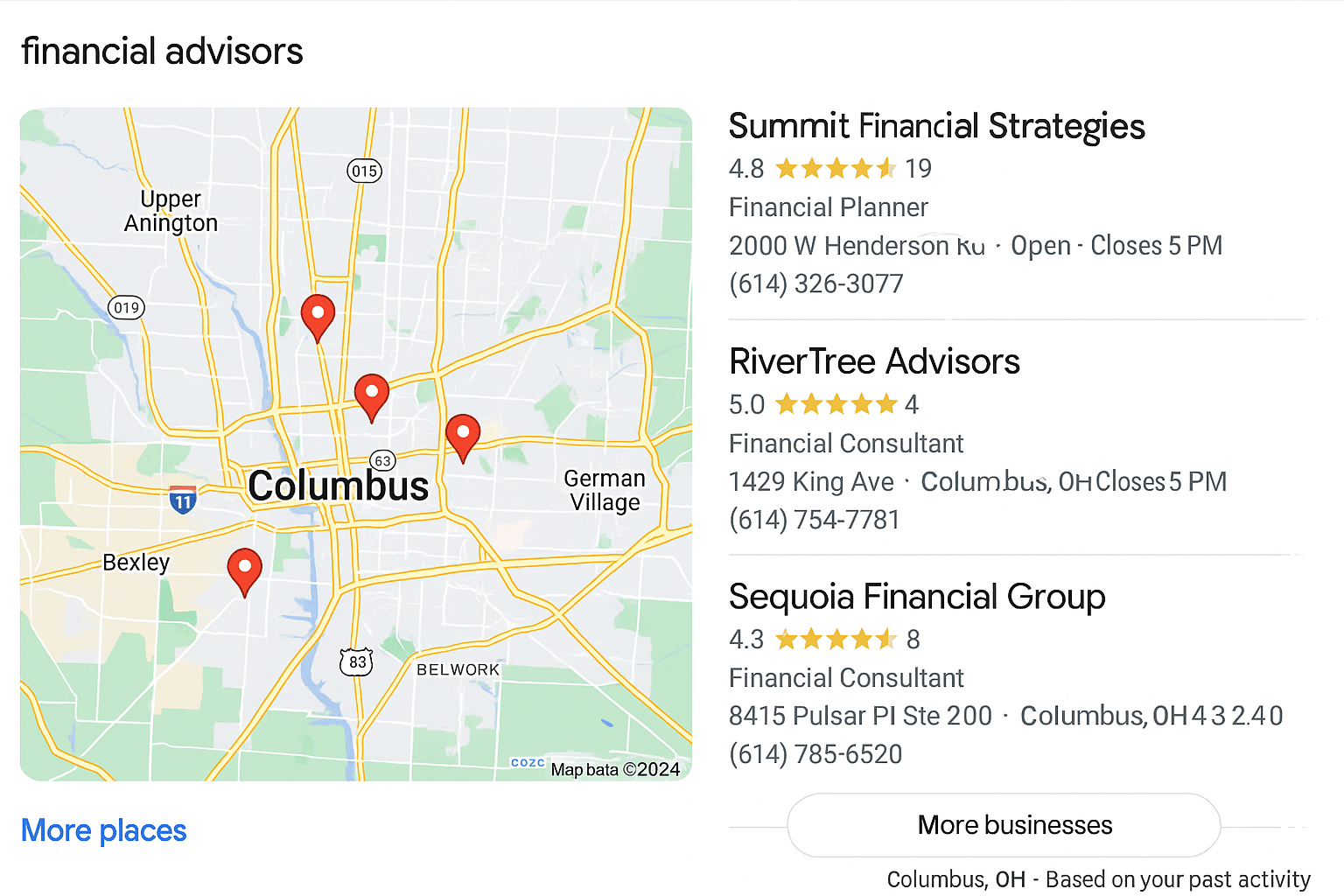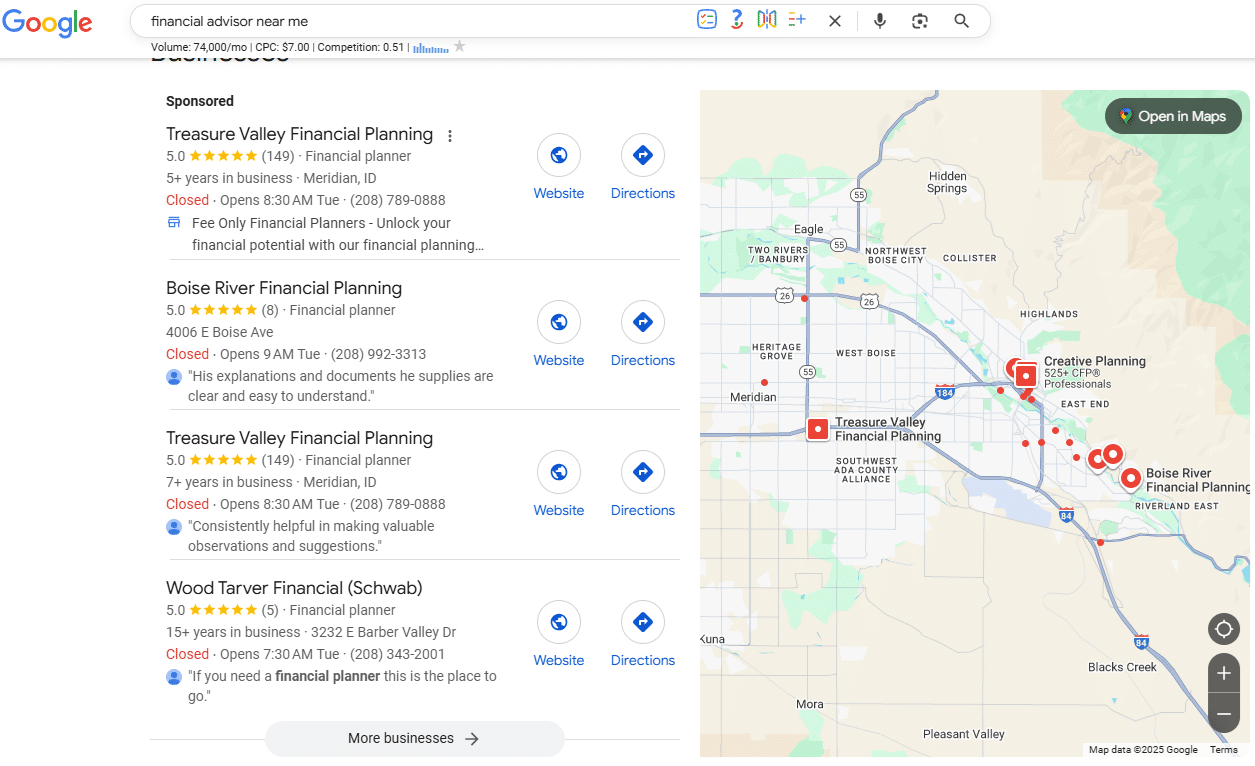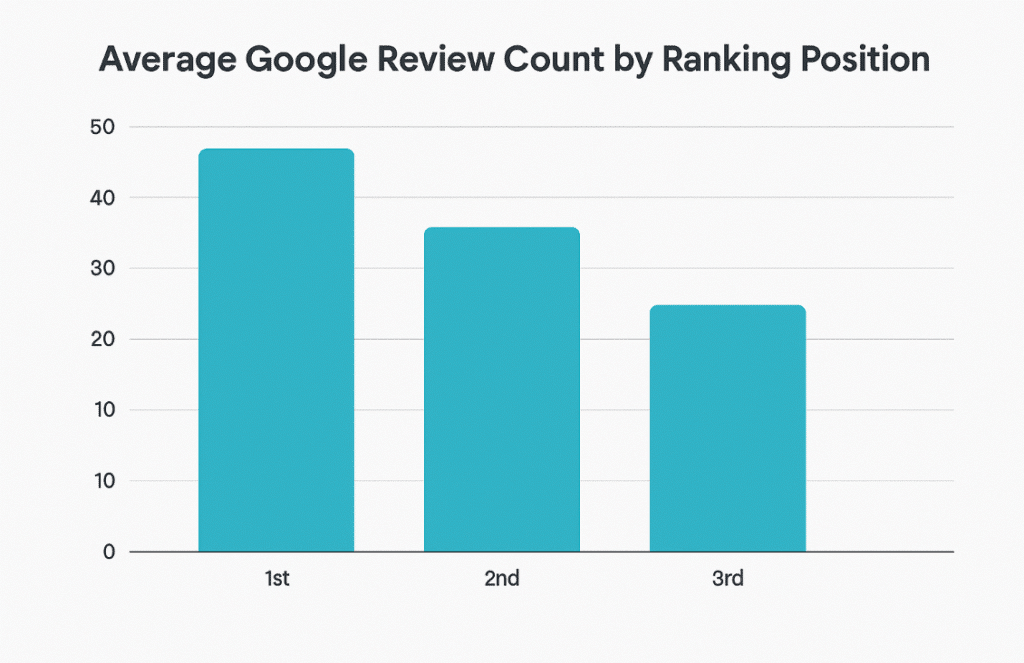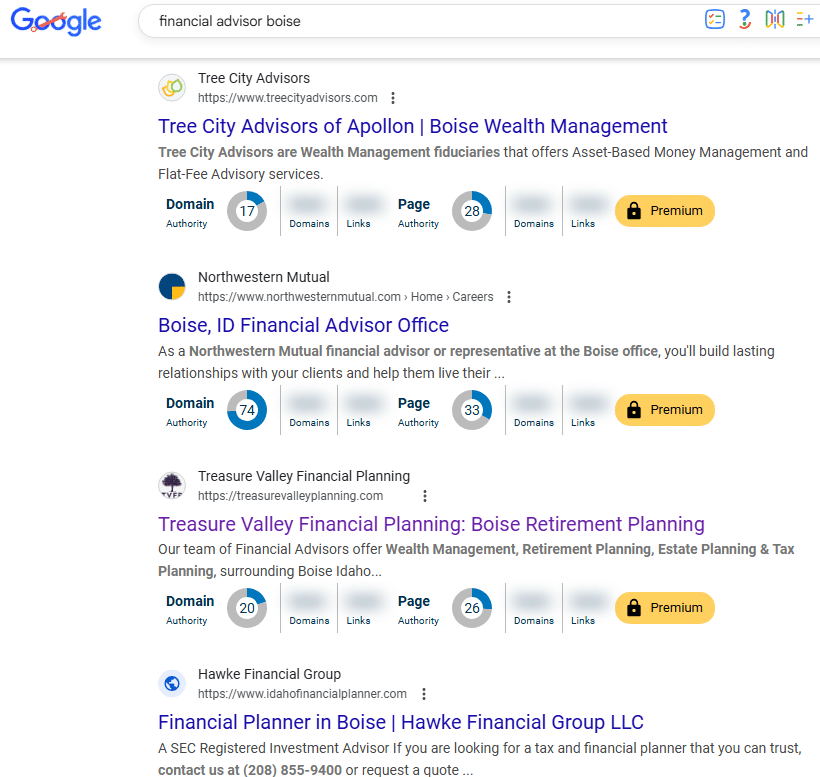Local SEO for Financial Advisors
For many financial advisors, marketing efforts focus on building a polished website and producing thought-leadership content. Even firms already investing in SEO often take a national or broad-topic approach, overlooking the clients right in their own backyard. Local searchers typically have higher intent. In fact, they’re actively looking for someone nearby to help with their financial needs. That makes local SEO a growth lever that can deliver highly qualified leads without competing on a national scale.
Local SEO is about more than showing up on Google; it’s about showing up in the right places, for the right people, at the right time. Advisors who live and work in a specific community often have a built-in advantage, because Google’s map pack prioritizes proximity and rewards firms with strong local presence. When done well, local SEO makes it easier for prospective clients in your area to find you, learn about your services, and feel confident reaching out.
Local search itself is also changing. In addition to traditional search results, AI-powered tools and voice assistants are beginning to incorporate local business information directly into their answers. The financial advisors who optimize now won’t just stand out in Google’s map pack; they’ll also be prepared for how clients will discover businesses in AI-driven platforms.
In this guide, we’ll break down what local SEO means for financial advisors, why it matters more than ever, and how to put it to work so your ideal clients can find you where they’re already looking.
What is Local SEO?
Local SEO (search engine optimization) is the process of improving your online visibility so people in your area can find you when they search for the services you offer. While traditional SEO focuses on ranking for keywords no matter where the searcher is located, local SEO zeroes in on geographic relevance.
For financial advisors, that might mean showing up when someone types “financial advisor near me” or “retirement planning in [Your City].” It’s about making sure your business appears in Google’s map results, local directories, and AI-powered search responses, not just in the regular search listings.
Why Local SEO Matters for Financial Advisors
When someone searches for a financial advisor, they’re not just looking for expertise; they’re looking for someone they can trust as well. That’s why local visibility is so powerful: it puts you in front of people who are both ready to take action and often prefer working with someone nearby. Even with the convenience of online meetings, many clients still feel more confident choosing an advisor they could meet in person if they wanted to.
Trust, Not Just Traffic
Showing up in local search results, especially in Google’s map listings, signals credibility. Clients often perceive top local results as established and reputable, simply because they’re visible in trusted spaces. Add positive reviews and consistent business information, and that trust factor grows even stronger.
Turning Browsers into Clients
Local SEO connects you with prospects who are already in the decision-making stage and searching for services like yours in your area. At this point, it’s less about awareness and more about making it easy for them to choose you through strong visibility, positive reviews, and clear, local-focused messaging.
Staying Competitive
Whether you notice it or not, other advisors in your market are competing for those same local searches. If you’re not visible, someone else is getting those clicks and, possibly, those clients. A solid local SEO strategy ensures you’re part of that consideration set.
AI’s Role in Local Search Visibility
AI-powered tools such as Google’s AI Overviews, Bing Chat, and voice assistants are now surfacing local business information directly in their answers. These platforms frequently pull from Google Business Profiles, reviews, and directories. That means optimizing these assets today not only helps in Google’s map pack but also increases the chance your firm is mentioned in AI-generated answers tomorrow.
The Three Biggest Drivers of Local SEO Success
If you’re short on time, focus here:
Google Business Profile Optimization – The single most important step to appear in Google’s local pack.
Reviews – Recent, positive, and consistent reviews are the strongest trust and ranking signals.
Location Relevance – Clear address, service area, and location-focused content connect you to the right searchers.
These three factors are the foundation. In the next section, we’ll expand on how to put them into practice.
The Core Components of Local SEO for Financial Advisors
Local SEO works best when you build a strong foundation. At the heart of that foundation are your Google Business Profile, your reviews, and your location relevance. These drive most of your visibility in Google’s map pack. Let’s look at how to strengthen each of them, along with the other pieces that round out a competitive local presence.
Google Business Profile: Your Digital Shop Window
Your Google Business Profile (GBP) is often the first thing prospective clients see in search results. A complete, well-maintained profile with accurate details, photos, and regular updates makes a strong first impression. Think of it as your storefront on the digital main street – inviting, informative, and up to date.
Be sure to:
- Choose the right categories. Primary should be “Financial Advisor” or “Financial Planner,” with secondary categories like “Investment Service.”
- Fill in attributes such as “women-led,” languages spoken, or other relevant details.
- Add Services and Products so your listings can trigger “justifications” in the map pack.
- Use real addresses. No P.O. boxes or virtual offices. If you operate as a service-area business, set a service area and hide the address if appropriate.
For multi-advisor firms, set up both a firm profile and individual practitioner profiles (each tied to unique phone numbers and landing pages).
Why “Near Me” Searches Matter for Advisors
When people type “financial advisor near me” or “retirement planner near me,” they’re showing the highest intent – they’re actively looking for someone to hire locally. These searches are powered by Google’s map pack and local listings, which prioritize relevance, proximity, and prominence. The key is making sure your Google Business Profile is complete, your reviews are strong, and your website makes your location clear.
For a deeper dive into how to rank for these searches, see our full guide on How Financial Advisors Can Win “Near Me” Searches.
What Triggers Local Search Results
The truth is, a search doesn’t always need “near me” to show local results. Google detects local intent from city names or simply from the searcher’s device location. For example, a search for “financial advisor” on a phone in Denver will almost always display Denver-based firms first. That’s why local SEO is essential even if “near me” doesn’t show up in your analytics – proximity is baked into how search works.
Local Citations & Directories: Showing Up Everywhere
Local citations are mentions of your business on other websites, such as local directories, chamber of commerce pages, or industry-specific listings. Consistent name, address, and phone number (NAP) information across all platforms builds trust with both search engines and clients. Claim Apple Business Connect and Bing Places in addition to Google, and ensure listings on industry directories like NAPFA, CFP Board’s “Find a CFP,” AdvisorInfo/FINRA, and local chambers of commerce.
Online Reviews: The Ultimate Social Proof
For many people, reviews are just as important as personal recommendations. Reviews don’t just influence prospects; they also play a major role in how prominently you appear in Google’s local map pack.
With the SEC’s marketing rule now allowing testimonials under certain conditions, financial advisors can compliantly ask for reviews. The key is to request them consistently, not incentivize, and monitor compliance around language. A steady flow of recent, positive reviews signals to search engines that your business is active, relevant, and trusted. Always respond professionally to reviews, both positive and negative, and use the Q&A feature in GBP to address common client questions.
For a deeper dive into how reviews shape advisor visibility, see our full research article on How Many Google Reviews Top-Ranked Financial Advisors Actually Have.
Location-Specific Website Content: Speak to Your Neighborhood
Create website pages and blog posts that address the needs of clients in your area. This might include location-specific service pages, local market updates, or community event recaps. Content that feels close to home connects with clients on a personal level while boosting local relevance. Avoid creating thin “doorway” pages – instead, make each page genuinely useful with unique details, FAQs, and calls to action.
Mobile Optimization and Core Web Vitals
A growing number of local searches happen on mobile devices. Your website should load quickly, be easy to navigate, and display properly on smaller screens. Google also measures Core Web Vitals – Largest Contentful Paint (LCP), Cumulative Layout Shift (CLS), and Interaction to Next Paint (INP) – to evaluate site speed and usability. Compress images, use browser caching, and streamline fonts to improve performance.
Organic Local Rankings Still Matter
While the map pack gets the most clicks, the organic results below it still drive meaningful traffic. These often include advisor websites with strong local content, such as service pages, blogs, or community-specific pages. A well-optimized site can rank in both the map pack and the organic listings, doubling your local visibility.
Unlike the map pack, organic local rankings are heavily content-based. Search engines want to see dedicated pages that clearly describe your services, your location, and how you serve clients in that area. For advisors, this often means creating separate service pages (for example, “Retirement Planning in Denver” or “Financial Advisor in Austin”) so each page can directly target the keywords and questions local clients are searching for. Internal linking between these local pages and your core services strengthens authority and improves navigation.
Beyond the Basics: Advanced Local SEO Tactics
The fundamentals get you in the game; advanced tactics help you stand out in competitive markets and adapt to where local search is headed.
Leveraging Local Link Building
Links from other trusted local websites signal to search engines that your business is part of the community. Partner with local organizations, sponsor events, or contribute to community news outlets to earn high-quality local backlinks.
Schema Markup: Helping Search Engines Understand You Better
Schema markup is code you can add to your website to help search engines better understand your business information, including your location, services, and reviews. For financial advisors, LocalBusiness or FinancialService schema is most appropriate. Include details such as name, address, phone number, geo coordinates, hours, sameAs profiles, and where possible, Service and Review markup. This structured data can improve both traditional search visibility and AI-driven answers.
Geo-Targeted PPC: When You Need to Jump the Line
Pay-per-click advertising targeted to your geographic area can put you in front of local prospects quickly, especially if you’re competing in a dense market. It works best as a complement to organic local SEO, filling gaps while your long-term strategy builds momentum.
AI-Driven Local Search Optimization
AI tools increasingly reference local profiles, reviews, and directories when suggesting service providers. To strengthen your AI visibility:
- Keep your Google Business Profile fully updated with detailed service descriptions and images
- Maintain a steady stream of recent, positive reviews
- Publish clear, well-structured location-based content on your website
- Build mentions across trusted industry sites and local media
Common Local SEO Pitfalls to Avoid
Local SEO is powerful, but missteps can set you back or undo the progress you’ve made. Avoiding these common mistakes will keep your visibility and reputation moving in the right direction.
Not Requesting Reviews: Many advisors hesitate to request reviews, but without a steady flow of new ones, your visibility will suffer. There are platforms built to help advisors collect compliant Google Reviews.
Ignoring Negative Reviews: No business gets all five-star reviews. What matters is how you respond. Ignoring negative feedback can make prospects think you don’t care, while a thoughtful, professional reply shows that you listen and take concerns seriously.
Inconsistent Information Across Platforms: Your name, address, and phone number (NAP) should be identical everywhere online – from your website to your Google Business Profile to local directories. Inconsistencies can confuse both search engines and potential clients, hurting your visibility and credibility.
Neglecting Your Google Business Profile After Setup: Claiming your Google Business Profile is only the first step. Failing to keep it updated with fresh photos, posts, and accurate information can cause you to slip in rankings over time. At a minimum, review and update it monthly to ensure it stays relevant and visible.
Overlooking Competitor Spam: Competitors sometimes use keyword-stuffed names or fake locations to game rankings. Monitor the map pack regularly and use “Suggest an edit” or Google’s Business Redressal Form to report spam.
Measuring Success in Local SEO
Improving your local search presence is only half the job. You also need to know if your efforts are paying off. Tracking the right metrics helps you understand what’s working, what needs attention, and how local SEO is contributing to real business results.
Tracking Local Rankings
Monitor how you rank for location-specific keywords like “financial advisor in [Your City]” or “retirement planner near me.” Use tools that display rankings from different locations to get a realistic view of your visibility.
Monitoring Website Traffic from Local Searches
Look at analytics data to see how much of your website traffic comes from people in your target area. Rising local traffic over time is a good sign that your visibility efforts are working.
Tracking Inquiries and Client Acquisitions
Ultimately, the best measure of success is whether local SEO is helping you win new clients. Track form fills, phone calls, and consultation bookings that come from local searches, and compare them to your overall lead numbers. Use UTM-tagged URLs for your Google Business Profile and call tracking numbers (as secondary lines) to attribute leads accurately.
Metrics aren’t just numbers – they’re insights. By tracking rankings, traffic, and conversions together, you’ll see the full picture of how local SEO is growing your business.
Don’t Leave Local Search Opportunities on the Table
Local SEO can be one of the most effective ways for financial advisors to connect with people who are ready to take action and nearby enough to meet in person. By building a strong foundation, layering in advanced tactics, and keeping your profiles and content up to date, you can make it easier for the right clients to find and choose you.
And with AI playing a growing role in how local results are delivered, now is the time to prepare your online presence for both today’s searches and tomorrow’s technology. We can help you build a strong SEO strategy and get your business seen. Set up a no-cost meeting with Advisor Rankings today.
Learn more about our SEO services or schedule an introductory call with us today.
Brent is the Principal and founder of Advisor Rankings - a specialized SEO and AI search optimization agency dedicated to helping independent financial advisors strengthen authority, boost traffic, and attract high-quality leads online.
- Brent Carnduff






